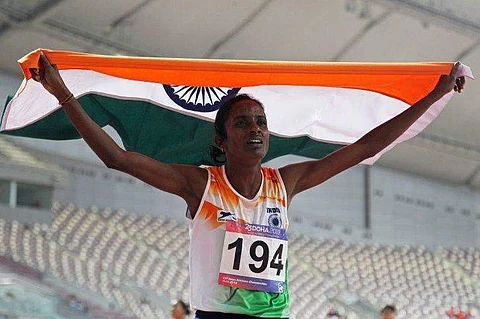

As Gomathi Marimuthu made her way into the corridors of the Velammal School, she looked serious. Even as the cameramen scrambled over one and another to get her video, she had the same look. When she went on stage and was felicitated, she remained demure. Then she was asked to hand out prizes to young athletes in the school and suddenly, a smile erupted. She put her hands around the young athletes and finally smiled for the camera.
This was Gomathi's first interaction with the press after her arrival in the city. The 30-year-old's fame is long overdue and she seemed pleased by it all and yet, it didn't faze her too much. "I've struggled long and was pushed to the brink many times, I thought of quitting but I held on," she said. As many news reports have already said, Gomathi's father was the one to encourage her from the very beginning. Here too, Gomathi repeatedly mentioned her father, "Whether the alarm went off or not, my father would wake me up at 4 am and I would start practising. If my mother was ever ill, my dad would be the one to get up and heat milk for me to drink in the morning. Everytime there was news about me in the paper, he would show all our neighbours and safely store all the newspaper clippings," she said, then breaking into tears.
Asked to speak about how the people in the village had reacted to her win, Gomathi said that they are all overjoyed because this is the first time the media is even entering her village. "It's a very remote area, deep inside a forest. When my dad was alive, every time his friends read some news about me they would rush to the house and tell him. This time the media went to my home and told my mother and the neighbours, it's a great feeling," she said. Describing her village, Gomathi said that there wasn't even a proper road for her to run on, no electricity and no buses from her village. "Only at certain times would there would be a bus and I would take it to go to school, otherwise there was nothing," she said.
About two years ago, after an injury, Gomathi thought her dream of competing internationally was over. "I thought I was too old anyway, but some people around me continued to have faith. They said I could still compete and so I kept training," she said. The loss of her father and then even her coach, deeply impacted her life. But she said she kept at it. She kept training.
Having a full time job, which she got through the sports quota also meant lesser time to practice. "I was told to concentrate on my work and so I did that. At that point, I thought I should give up forever. But something kept me going," the gold medallist said.
Talking about how glad she was to be receiving all the attention, she said she hoped this would help other young athletes from backgrounds like hers. "I won this medal because I worked very hard. I struggled so much to get here. I come from a family that struggled for food, when my dad was sick and in the hospital too, we didn't have food. But my dad would ensure I ate, somehow. He was truly my God. That's the family I come from and standing here today is a testament to all my struggles and the fact that I kept training day and night," the athlete said.
Privileged athletes also get coaches who are highly influential, "Such coaches can also get sponsors but I was not able to get any sponsors. I paid for my tickets and stay with the money I earned," she said. The young sprinter was the one who funded the education and marriage of her sisters and brothers as well. Even when she competed in the race this time, she was wearing torn spikes, "The other contestants were wearing good sports wear but I had some plain clothes, which is not a bad thing but then I had to wear torn spikes. That made me feel bad," she said.
Today, she hopes that she gets a sponsor who can help her compete in the Olympics. "That's my next plan. I will start to train for the Olympics and I hope the Central and State government support me," she added. She is glad her boss in has given her a promotion - after all the media frenzy - this time she knows they will support her in her next race as well.
"There are lots of people I look up to who come from backgrounds like mine and still manage to compete. People like Shanthi. And I know there are people who are still aspiring and struggling hard. I only want to tell them to manage with what they have but to never give up on their dreams," she said.
Just as we leave, I mentioned that I had spoken to her school and college teachers and then there it was - that bright smile. Her restrained body language suddenly changed and then she grabbed the closest sheet of paper, shoved a pencil towards me and said, "Can you write down their numbers. I have lost contact with them and really want to speak to them." And as I wrote down the number, I saw the gold medallist attend her next interview and I left thinking that nobody deserved to win the Olympics more than her. Here's wishing her all the very best.
